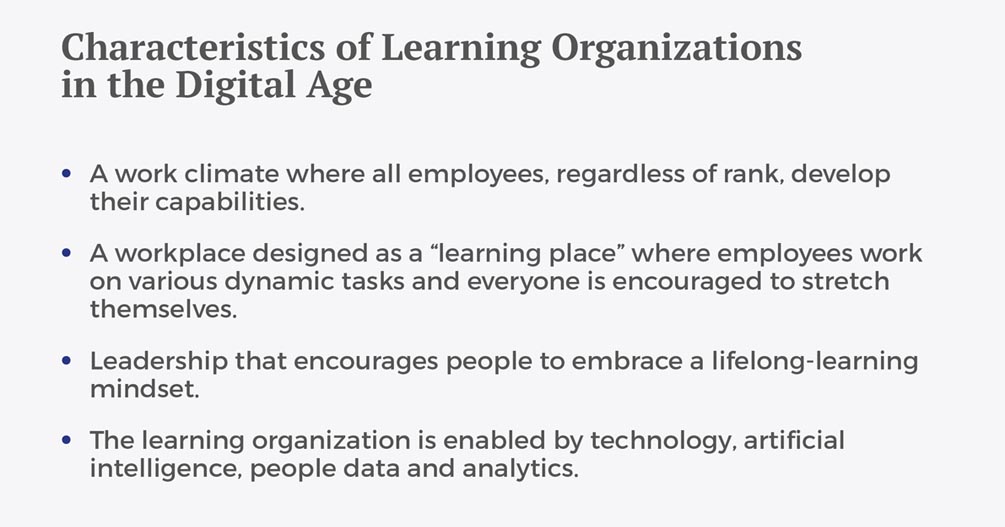According to the World Economic Forum (WEF), we are now on the cusp of a fourth industrial revolution (also referred to as the Digital Age) fueled by technological advancements. The Internet of things, the mobile Internet, big data, predictive analytics, artificial intelligence, machine learning, and robotization are poised to have a huge impact on organizations. We are now entering a period of disruption that will change the way we work. Nowadays, in the initial stages of the revolution, people perform 71% of processes and machines do the rest. The WEF predicts that technology will be handling 52% of current work tasks by 2025. Rather than dwelling how many jobs will be lost, organizations and people need to focus on preparing for the jobs of the future. The figures are staggering, but it is possible to take the optimistic view that this new scenario is actually an opportunity.
Certain parallels can be drawn with past revolutions, but the biggest difference has to do with productivity. Thanks to technology, companies have become vastly more productive while reducing the number of hours worked. Furthermore, with more people on our planet and more people in emerging countries entering the middle class, the global economy continues to grow. Herein lie other hopeful lessons.
By 2022, one third of the basic competencies required for most occupations will involve abilities not currently considered crucial.
Skills and knowledge for the future
Realistically, the only way to navigate this context is to acquire new competencies. We mustn’t get too smug, especially since many of the necessary skills will involve problem-solving and critical thinking. Here’s another skills-related prediction from the WEF: by 2022, one third of the basic competencies required for most occupations will involve abilities not currently considered crucial.
According to a McKinsey study, problem-solving will be one of the key skills of future leaders. A huge amount of data flows through companies. The ability to understand and interpret this information—and make decisions accordingly—will be a driving force of management. Knowledge of digital technologies needs to be combined with human skills. The world of education must therefore ensure that students receive a core education in digital technologies, programming, designing information systems, big data, and predictive analytics.
Creativity for survival: a necessary climate
Businesses used to enjoy a long lifespan, but today it is rare for even the most prestigious S&P companies to last more than 15 years in their existing form. This major shift has to do with the difficulty of aligning an organization’s strategy with the changing environment. Innovation, creativity, and leading change are the foundation of survival. Employees must ask themselves how they could do their jobs more efficiently and effectively and what changes could help the company leapfrog the competition. It’s a question of mindset: success in the past is not a guarantee for the future.
These sorts of skills are what distinguish people from machines. Major corporations all over the world are starting to understand that soft skills are the cornerstone of human resource management. Until proven otherwise, humans are superior to machines in all sorts of social skills: emotional intelligence, creativity, ideation, persuasion, leading others, and the art of negotiation, to mention just a few. To conquer the world, future talent must build a résumé filled with these sorts of competencies.
Digital transformation is an opportunity that all companies will undertake over the next five years, but the true key to success in a digital transformation is to develop each member of the organization.
Job opportunities and trends
Current employment trends provide a clue about the job opportunities created by new technologies. In the United States, the most sought-after professional skill set is that of the (mobile) app developer—a profile that just over a decade ago did not even exist. In fact, when the iPhone was first released in 2007, developers were very hard to come by, but today there are more than 20 million of them.
The authors of The Second Machine Age argue that there are more opportunities available today—for those who possess the right skills—than at any time in the past 40 years, thanks to the characteristics of the new economy. But for those who lack the necessary skills, the next 10-15 years will be perilous, since they will face the constant threat of machines stealing their job.
Learning is the solution
Great leaders understand that education and learning are essential if you don’t want to be left behind. In the words of Bosch CEO Volkmar Denner: “Get learning, or stay analog.” That’s not a threat; it’s a call to action meant to empower people.
Digital transformation is an opportunity that all companies will undertake over the next five years, but the true key to success in a digital transformation is to develop each member of the organization. All transformations need to inspire people and promote a new way of working. Teams—and the leadership thereof—are the best arguments to justify any investment in people capabilities. Success in digital transformation comes down to people having the right capabilities and a lifelong-learner mindset.
© IE Insights.












